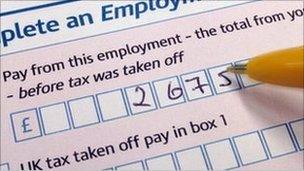Tax letters: little chance to avoid a new bill
- Published

The extra statutory concession is likely to help very few people
Six million taxpayers are about to be told by HM Revenue & Customs (HMRC) that they paid the wrong amount of tax in the past two tax years under the PAYE (pay as you earn) system.
For the majority, the letter will be welcome as they have paid too much tax and can expect a refund.
For the remainder, the letter will be rather less welcome as it will inform them that they have underpaid tax which will now have to be recovered from them.
Various suggestions have been circulating in the media as to how those facing a tax underpayment might use an HMRC procedure called the extra statutory concession to avoid paying the tax.
But, in the majority of cases this will, sadly, offer little hope.
Tall order
The concession will only assist where HMRC has been provided with full information about a taxpayer's income or circumstances.

The Revenue is judge and jury in its own cause, warns Ronnie Ludwig
Also, the Revenue must have failed to act on this "full information" within a reasonable time - that is within 12 months from the end of the tax year in which they got the information.
Whilst there may be a number of cases where the concession is applicable and HMRC may then agree to write off the arrears, for the majority that is unlikely to be the case.
If we look at the way the PAYE system operates, it should not come entirely as a surprise that many people end up with under or overpayments of tax.
Income tax is collected from wages and salaries on the basis of a PAYE code number.
That code number depends on a combination of variables - personal allowances and deductions on one side and taxable amounts, such as benefits in kind as well as pay, on the other.
For the correct amount of income tax to be deducted at source, the PAYE code must reflect the correct value of all of those variables.
That is not impossible, but in many cases will be a tall order.
Still time to tax
Take an employee who has had a low-interest loan from their employer in 2008-09, for example.
The loan balance may have moved up and down over the course of that year as repayments were made, or further loans were advanced.
The actual taxable benefit for the year is unlikely to be known until after the end of the year.
And it would be highly unlikely that the 2008-09 PAYE code would have reflected the benefit accurately.
If the employee has already sent in a tax return for 2008-09 under the self-assessment system, then any under or overpayment of tax should have been picked up and resolved through that process.
However, if the employee has not been sent a tax return to complete - which is the case with the majority of employees whose affairs are relatively straightforward - he or she may be one of the recipients of the HMRC letters which are now being sent out.
HMRC would have been informed of the correct benefit figure in the subsequent 2009-10 tax year (by the employer sending in form P11D).
So in this example the Revenue is still within the 12 months time limit, which runs to 5 April 2011, for seeking payment of the arrears.
Challenge
What if you think the Revenue did in fact have all the necessary information about your 2008-09 tax affairs within that tax year?
And you also believe the recently revealed underpayment could have been picked up in the subsequent 12 months of the 2009-10 tax year?
Unfortunately for you, the HMRC can deny relief under the concession, by claiming it has discovered new facts.
Consider the case where you had not been sent a tax return to complete, and HMRC had sent out an inaccurate tax code number based on information supplied by your employer on a P11D.
This might have led to an underpayment of tax and you may, understandably, feel that this is not your fault.
However if HMRC subsequently "discovers" that the figures supplied on the P11D were wrong, even to a minor extent, that in itself could result in it denying relief under the concession.
Taxpayer responsibility
Estimates are part and parcel of the PAYE system.
We perhaps should not be too surprised when the result of using those estimates produces an inaccurate tax deduction.
Taxpayers do have responsibility for those estimates too and, as can be seen, PAYE code numbers are very important.
If one of the consequences of the current media coverage is that we spend more time now checking our PAYE codes, then we may avoid unwelcome letters from HMRC in future.
The opinions expressed are those of the author and are not held by the BBC unless specifically stated. The material is for general information only and does not constitute investment, tax, legal or other form of advice. You should not rely on this information to make (or refrain from making) any decisions. Links to external sites are for information only and do not constitute endorsement. Always obtain independent, professional advice for your own particular situation.
- Published7 September 2010
- Published4 September 2010
- Published23 July 2010
- Published21 July 2010